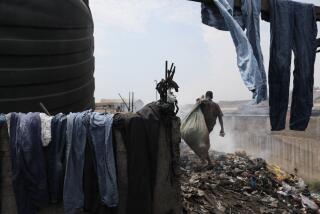Unseen Consequences of the Best Intentions
- Share via
Here is something to think about, along with that tax write-off, the next time you donate old clothes to charity. The documentary “T-Shirt Travels: The Story of Secondhand Clothes and Third World Debt” (on KCET tonight at 10) suggests that giving the shirt off your back can have unintended effects in our new world economy.
“You never know how far your clothes can go,” says one cheery passerby interviewed on a New Jersey boardwalk, perhaps unaware that tons of U.S. donations have found their way to Zambia, in effect crushing the African nation’s garment-making industry.
Shantha Bloemen’s provocative and politically charged one-hour film looks at the surprising impact of secondhand clothes on international economics. More broadly, she uses the garment trade as Exhibit A in an indictment of Africa’s “economic colonialism” at the hands of global bankers more worried about capital than people.
Bloemen tells the bittersweet story of Luka Mafo, an industrious 19-year-old Zambian clothing vendor, to illustrate how the secondhand garment trade works, while talking heads blame the World Bank and International Monetary Fund for Africa’s economic woes.
Bloemen, a former relief worker at a remote Zambian village who became fascinated by the incongruous images of local residents sporting AC/DC T-shirts or Chanel knockoff jackets, shines a light on a multibillion-dollar industry that has turned Africa into a dumping ground for used goods from North America and Europe.
Charities such as the Salvation Army sell many of their donated clothes to commercial dealers for 10 to 15 cents a pound. These clothes are then shipped to Africa, where vendors like Mafo buy them for $180 a bale, a markup of 300% to 400%. The vendors sell the garments at outdoor markets called “bend-down boutiques,” hoping to eke out a profit.
In Mafo’s case, he travels 10 hours by bus to the capital city of Lusaka to fetch each batch. After the market he hauls his unsold garments to the river, trading them for fish, which he tries to sell back at the capital. It’s all part of a struggle to keep his siblings in school and, perhaps, to someday realize his dream of buying a home with electricity and water for his family.
Bloemen captures the daily rhythms of a trying life. This is a hand-to-mouth business for Mafo--and for the unemployed nurses, teachers, civil servants and others in the same trade.
As compelling as this case study is, Bloemen’s broader case against globalization is not entirely convincing.
Zambia’s mountain of debt stemming from borrowing in the 1970s, when prices spiked for oil and plunged for its prized resource, copper, has left the country at the mercy of creditors and in a state of disrepair.
Free-market reforms demanded by creditors over the last 20 years have created great hardship, no doubt. Liberalized import laws, for example, led to the flood of cheap goods that has wiped out Zambia’s textile and garment manufacturing.
But it’s hard to believe that Zambia’s leaders share none of the blame for the nation’s troubles. It’s unclear how a hands-off policy by bankers would enable the country to climb out from its debt.
Still, Bloemen’s pointed questions are intriguing, even if she doesn’t have all the answers.
*
“T-Shirt Travels: The Story of Secondhand Clothes and Third World Debt” airs tonight at 10 on KCET.






